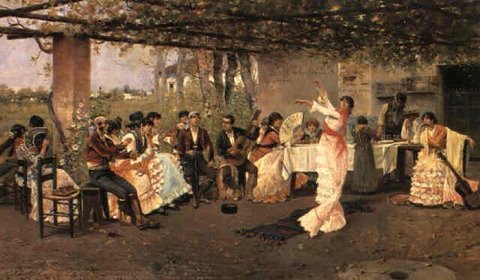Der Ursprung des Flamencos
Der heutige Flamenco stammt aus dem 18. Jahrhundert, aber die Kontroverse über seinen Ursprung ist noch nicht abgeschlossen. Zwei Theorien sind zu erwägen, allerdings wurde keine im Laufe des Geschichtes überprüft.
Ein maurischer Ursprung ist die am weitesten verbreitete Theorie. Aus der kulturellen Mischung zwischen Muslims, Einheimischen, Roma und Kastiliern wurde diese Kunst entstehen. Laut der RAE („Königlich Spanische Akademie“) wird der Flamenco mit der Roma verbunden (flamenco, ca. 3. Adj. „Bestimmte soziokulturelle Darlegungen, die im Allgemeinen mit der Roma verbunden sind, insbesondere in der Region Andalusien”).
Geographisch ist es zu denken, dass der Flamenco seinen Ursprung am Ende des 18. Jahrhunderts in den landwirtschaftlichen Gebieten sowie den Städten der südlichen Andalusien (Cádiz, Córdoba, Huelva und Sevilla) hat. Allerdings gibt es praktisch keine Daten aus dieser Zeit.

La bailarina de flamenco (1879), Rafael Senet Pérez.